
Expert Verified, Online, Free.

DRAG DROP -
An engineer is implementing NetFlow on a Cisco Nexus 7000 Series Switch.
Drag and drop the NetFlow commands from the left into the correct order they must be entered on the right.
Select and Place:
Correct Answer:

Reference:
https://www.cisco.com/c/en/us/support/docs/switches/nexus-7000-series-switches/112213-netflow-nexus7000-nsox-configex.html
Which virtual MAC address is the default for HSRP version 2 group 10?
Correct Answer:
B
🗳️
In HSRP version 1, group numbers are restricted to the range from 0 to 255. HSRP version 2 expands the group number range from 0 to 4095.
HSRP version 2 permits an expanded group number range, 0 to 4095, and consequently uses a new MAC address range 0000.0C9F.F000 to 0000.0C9F.FFFF.
The increased group number range does not imply that an interface can, or should, support that many HSRPgroups. The expanded group number range was changed to allow the group number to match the VLAN number on subinterfaces.
The last digits of the MAC address is the HSRP group, in hex. 10 in hex is A.
Reference:
https://www.cisco.com/c/en/us/td/docs/ios-xml/ios/ipapp_fhrp/configuration/15-mt/fhp-15-mt-book/fhp-hsrp-v2.pdf
Refer to the exhibit.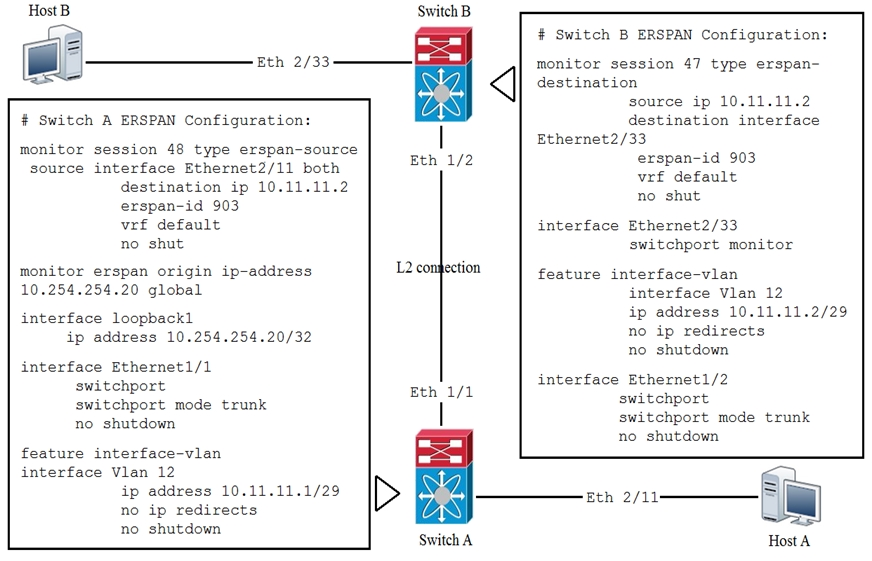
Which statement about the ERSPAN configuration in this environment is true?
Correct Answer:
D
🗳️
The Erspan-id needs to match between the switches. The ג€monitor sessionג€ ID is only locally significant and does not need to match on each device.
Reference:
https://www.letsconfig.com/how-to-configure-erspan-on-cisco-nexus-switches/
Refer to the exhibit.
Which two statements about the routing table of the leaf switch are true? (Choose two.)
Correct Answer:
AD
🗳️
10.20.1.0/24 is a BD in ACI because of the part which says "direct, pervasive".
For the other answer choice, we see form the administrative distance and the "internal" naming, we know that this is an external subnet (172.16.100.0/24) and that as all external routes are exchanged withing the fabric through MP-BG. MP-BGP is actually used to populate the leaves in the fabric with routing on how to reach those external routes. In MP-BGP, the spines are only the route reflectors. So from this we know that the next hop of the external subnet will be a VTEP of a leaf.
Which mroute state is created when Bidirectional PIM is deployed at a site?
Correct Answer:
A
🗳️
Bidirectional PIM is a different flavor of multicast than what you are probably used to (sparse, dense and sparse-dense mode). Most multicast networks have a couple of sources and many receivers. Bidirectional PIM has been invented for networks where we have many sources and receivers talking to each other. An example of this is videoconferencing where it's not just 1 source with many listeners but all the participants are communicating with each other.
The downside of using PIM sparse mode with many active sources and receivers is that we will see many mroute state entries that can take quite some resources. Using PIM sparse mode the RP builds 2 entries:
(*,G)
(S,G)
When we use PIM bidirectional mode the RP will never build a (S,G) entry and we only allow the (*,G) entry for the shared tree. PIM routers will never build the
SPT (Shortest Path Tree) towards the source.
Reference:
https://networklessons.com/multicast/multicast-bidirectional-pim
Refer to the exhibit.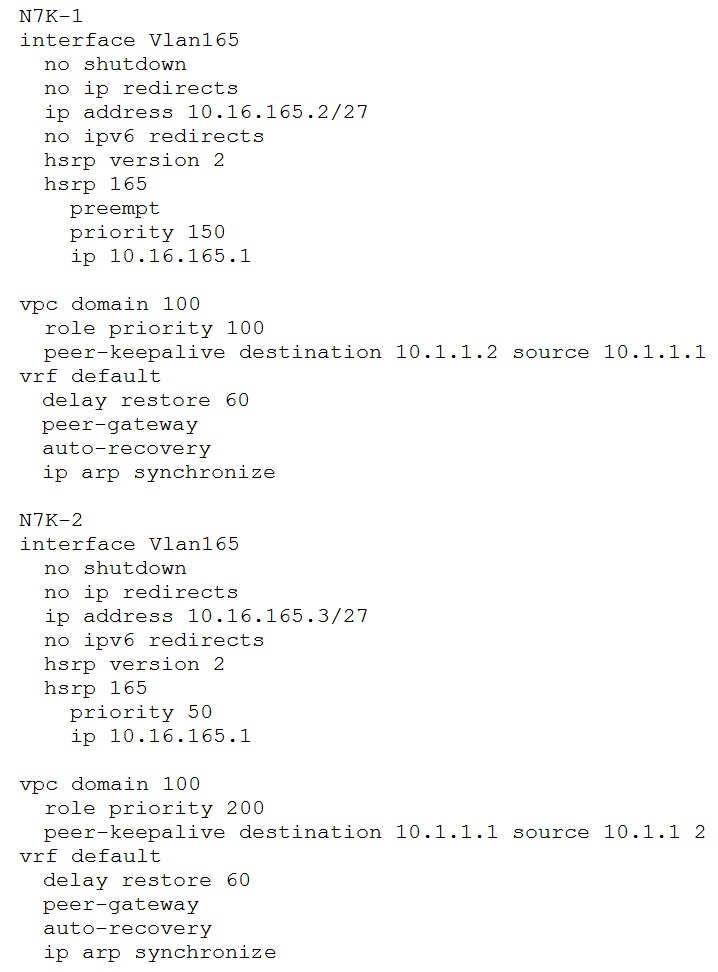
Which statement about the default gateway configuration of the vPC is true?
Correct Answer:
A
🗳️
In normal Hot Standby Router Protocol operation, the active HSRP interface answers ARP requests, but with a vPC, both HSRP interfaces (active and standby) can forward traffic.
The most significant difference between the HSRP implementation of a non-vPC configuration and a vPC configuration is that the HSRP MAC addresses of a vPC configuration are programmed with the G (gateway) flag on both systems, compared with a non-vPC configuration, in which only the active HSRP interface can program the MAC address with the G flag. Given this fact, routable traffic can be forwarded by both the vPC primary device (with
HSRP) and the vPC secondary device (with HSRP), with no need to send this traffic to the
HSRP primary device. Without this flag, traffic sent to the MAC address would not be routed.
Reference:
https://books.google.com/books?id=5VXUDwAAQBAJ&pg=PT161&lpg=PT161&dq=%22normal+Hot+Standby+Router+Protocol+operation,+the
+active+HSRP%22&source=bl&ots=dbSA3yl8BW&sig=ACfU3U1uGuplof1lJ4GF-
0VVkqpjjFz0yA&hl=en&sa=X&ved=2ahUKEwia0MLTpvf4AhWmFzQIHQyCCtcQ6AF6BAgCEAM#v=onepage&q=%22normal%20Hot%20Standby%20Router%
20Protocol%20operation%2C%20the%20active%20HSRP%22&f=false
Refer to the exhibit.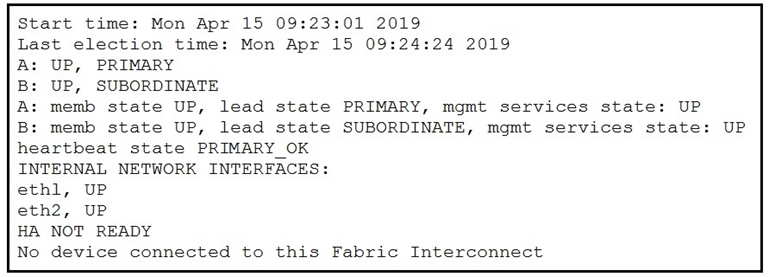
What must be connected to clear the HA NOT READY status?
Correct Answer:
B
🗳️
Reference:
https://ucsguru.com/2012/11/07/ha-with-ucsm-integrated-rack-mounts/
A small remote office is set to connect to the regional hub site via NSSA ASBR.
Which type of LSA is sent to the remote office OSPF area?
Correct Answer:
A
🗳️
The remote site is connected to the Hub site via an ASBR router. Hence, an ASBR router redistributes a non OSPF or an External route into the NSSA area which is a Type 7. There is no ABR router in the question.
Which adjacency server configuration makes two OTV edge devices located in the same site bring up the dual-site adjacency?
A.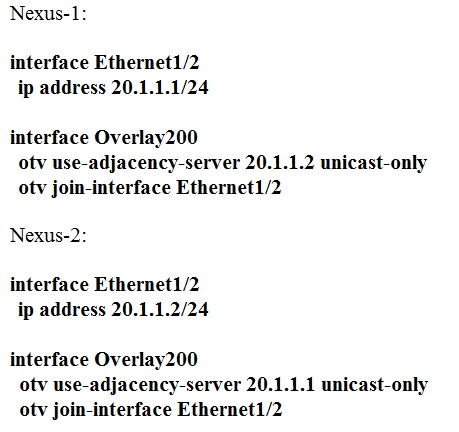
B.
C.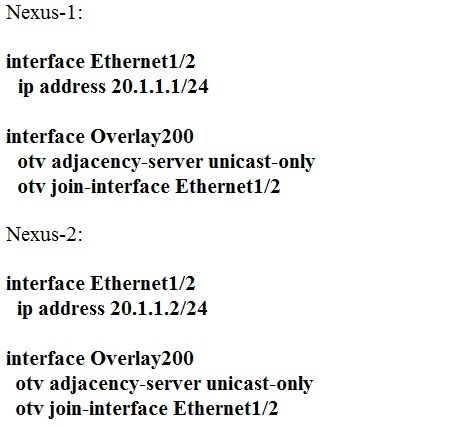
D.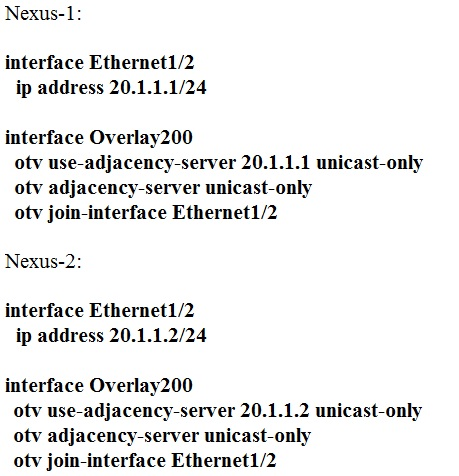
Correct Answer:
B
We need to setup a primary adjacency and a secondary adjacency. On primary, we need to setup 'otv-adjacency-server unicast-only' and on the secondary we need to configure 'otv use-adjacency-server <IP address from primary join interface> unicast only.
Refer to the exhibit.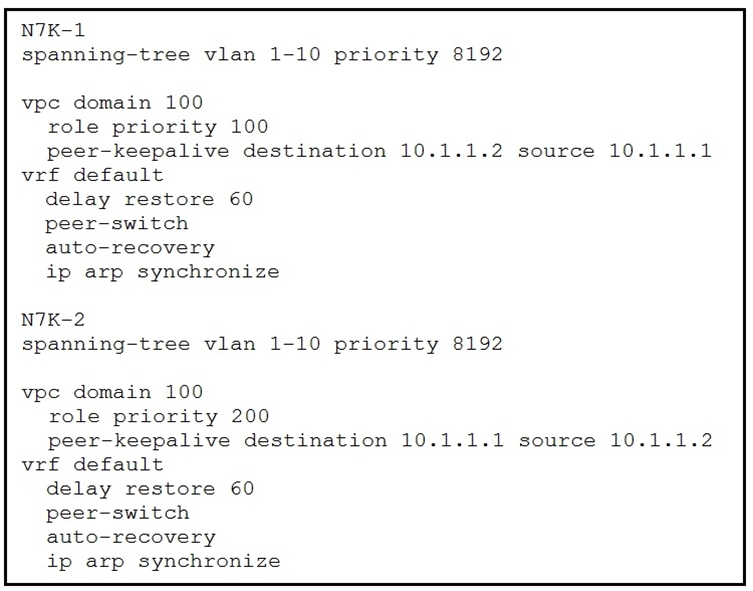
The STP priority of N7K-1 and N7K-2 are the lowest in the network.
Which statement describes STP on the vPC?
Correct Answer:
A
🗳️
Peer-switch - Enables the vPC switch pair to appear as a single STP root in the Layer 2 topology. Use the no form of the command to disable the peer switch vPC topology. If both switches do not have peer-switch enable, the question is not informing the bridge-ID (mac-address + priority) to see which switch would be the root anyway.